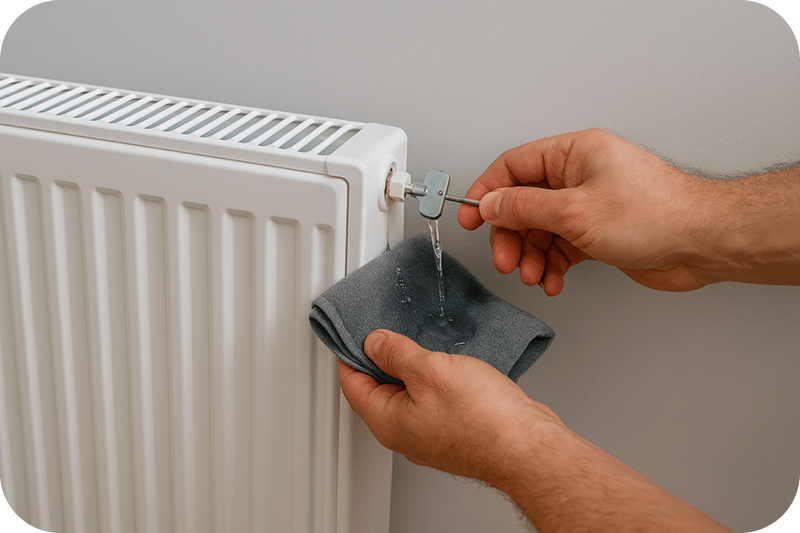When Should You Bleed Your Radiators?
You should bleed your radiators if:
- The top of the radiator feels cold while the bottom is warm
- You hear gurgling or bubbling noises from radiators or pipes
- Your heating takes longer than normal to warm up
- Your boiler pressure is dropping
- You have not bled them in the last 6 to 12 months
Tip: Always bleed radiators before winter to improve efficiency and comfort.
What You Need to Bleed a Radiator
- A radiator bleed key (sold in DIY shops and online)
- A cloth or small container to catch water drips
- A towel to protect carpets or flooring
- Gloves (optional, but useful for older radiators)
How to Bleed a Radiator: Step-by-Step
Turn off the heating
Switch off your central heating system and wait until the radiators have cooled. This prevents hot water spraying out and keeps the job safe.Find the bleed valve
The valve is usually at the top corner of the radiator. It looks like a small square or slotted screw.Insert the bleed key
Place the radiator bleed key onto the valve. Hold your cloth underneath to catch drips.Turn the key anti-clockwise
Turn slowly to the left. You will hear a hissing sound as air escapes.Wait for water
When water flows out in a steady stream, the air is gone. Turn the key clockwise to close the valve securely.Check boiler pressure
Bleeding radiators can lower boiler pressure. Look at your pressure gauge — it should be between 1 and 2 bar (the green zone). If the pressure is too low, top up your boiler following the manufacturer’s instructions.
Radiator Bleeding Tips and Safety Advice
- Start with the radiator furthest away from your boiler and work towards the closest.
- Bleed all radiators, not just the one with problems.
- If your system loses pressure quickly, there may be a leak.
- If the water is dirty or rust-coloured, consider a power flush to clean your central heating system.
Common Radiator Bleeding Mistakes
Avoid these common errors:
- Bleeding a radiator while the heating is still on
- Opening the valve too quickly
- Forgetting to check boiler pressure afterwards
- Only bleeding one radiator instead of the whole system
When to Call a Heating Engineer
If bleeding does not solve your radiator problem, the issue may be:
- Sludge build-up in the system
- A faulty radiator valve
- Problems with your boiler or pump
- An unbalanced heating system
In these cases, it is best to contact a Gas Safe registered heating engineer.



